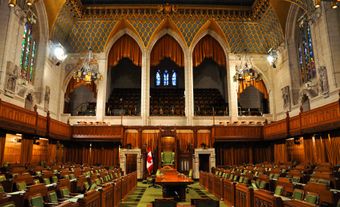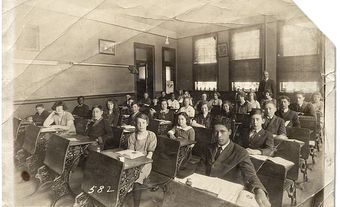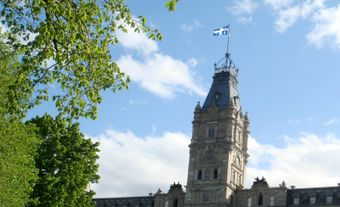Manitoba
Sometimes referred to as the “keystone” province because of its position in the centre of the country, Manitoba is bounded by Nunavut and Hudson Bay to the north, Ontario to the east, the United States to the south and Saskatchewan to the west.
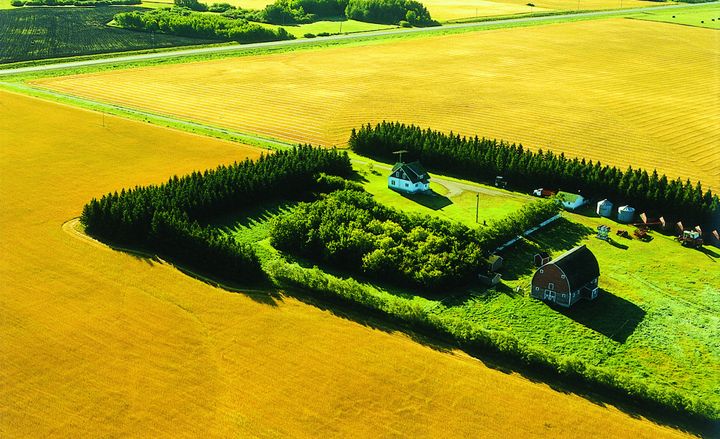
-
July 17, 1860
Resources and Environment
Total Eclipse Obscured
An American expedition, including Nova Scotia-born astronomer Simon Newcomb, arrived in northern Manitoba to observe a total eclipse, but were thwarted by clouds on the crucial day.
-
November 02, 1869

Government and Politics Indigenous Peoples
Red River Resistance
With 120 men, Louis Riel occupied Upper Fort Garry in the Red River Colony to block the transfer of Rupert’s Land from the Hudson’s Bay Company (HBC) to Canada. Known as the Red River Resistance, the Métis — led by Riel — and First Nations allies defended the Red River Colony from White settlers and government encroachment on their lands. Louis Riel was hanged for treason, and Cree chiefs Mistahimaskwa (Big Bear) and Pitikwahanapiwiyin (Poundmaker) were imprisoned. Promises to protect the Métis were still unfulfilled more than a decade later, sparking the Northwest Resistance in 1885. In 2019, Poundmaker was exonerated by the federal government.
-
May 12, 1870
Government and Politics
Manitoba Act
The Manitoba Act received royal assent. It created the province of Manitoba, Canada's fifth, and went into effect on 15 July.
-
July 15, 1870

Government and Politics
Manitoba Joins Confederation
The Manitoba Act went into effect, making Manitoba Canada's fifth province.
-
July 15, 1870
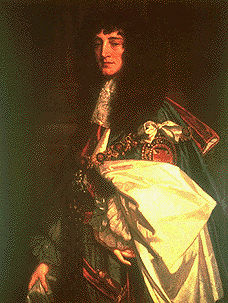
Government and Politics
Transfer of Rupert's Land
The British Crown officially transferred Rupert's Land and the North-Western Territory to Canada. These lands comprise present-day Manitoba, most of Saskatchewan, southern Alberta, southern Nunavut, and northern parts of Ontario and Québec.
-
March 10, 1871

Government and Politics
Manitoba's First Council
The first legislative council of Manitoba sat for the first time.
-
August 03, 1871
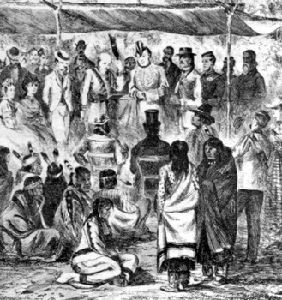
Indigenous Peoples
Treaty 1
The first post-Confederation treaty was signed at Lower Fort Garry, Man. The first of many “Numbered Treaties,” Treaty 1 was signed between the Crown and the Ojibwe and Swampy Cree Nations. The treaty included the provision of livestock, agricultural equipment and the establishment of schools in exchange for ceding large tracts of Indigenous hunting grounds.
-
August 21, 1871
Indigenous Peoples
Treaty 2
Treaty 2 was concluded with Chippewa of Manitoba, who ceded land from the mouth of Winnipeg River to the northern shores of Lake Manitoba across the Assiniboine River to the United States frontier.
-
October 03, 1873
Indigenous Peoples
Treaty 3
Treaty 3 was signed by the Saulteaux (Chippewa) of northwestern Ontario and of Manitoba. For the surrender of a tract comprising about 55,000 sq. miles, the Dominion Government reserved not more than one square mile for each family of five and agreed to pay $12 per head and an annuity of $5 per head.
-
April 08, 1875
Government and Politics
North-West Territories Act
The North-West Territories became a political entity separate from Manitoba. The territory would have its own lieutenant-governor and council.
-
September 20, 1875
Indigenous Peoples
Treaty 5
Treaty 5 was concluded at Lake Winnipeg ceding an area of approximately 100,000 sq. miles inhabited by Chippewa and Swampy Cree (Maskegon) of Manitoba and Ontario.
-
February 28, 1877
Sports and Culture
University of Manitoba Founded
The University of Manitoba was organized by provincial statute and opened June 20.
-
September 17, 1878
Government and Politics
Return to Power
Sir John A. Macdonald was defeated in his riding in Kingston but elected in Marquette, Manitoba, and then in Victoria, BC. (Elections were at that time held at different times across the country, and politicians could run multiple times.) He was re-elected as prime minister with a majority of the seats in the House of Commons on the strength of his National Policy platform, calling for high tariffs, the completion of the CPR and settlement of the West.
-
March 31, 1890
Government and Politics
Manitoba School Act
The Manitoba School Act abolished publicly funded support for separate schools for Catholics. The aggrieved French minority argued that the Act violated the agreements under which Manitoba entered Confederation.
-
February 20, 1894
Government and Politics
Manitoba Separate Schools
The Supreme Court refused the appeal of the Manitoba Roman Catholics after the abolition of separate schools.
-
July 04, 1904

Sports and Culture
Winnipeg Shamrocks Win First Olympic Gold in Men’s Lacrosse
The Winnipeg Shamrocks were one of two Canadian lacrosse teams that competed at the 1904 Olympic Summer Games. The Shamrocks won two games of field lacrosse to earn the first Olympic gold medal in men’s lacrosse. The 1904 Games also marked the first time Canada was truly represented at the Olympics.
-
May 14, 1912
Government and Politics
Ottawa Transfers Land
The federal government divested itself of responsibility for vast tracks of northern land by granting boundary extensions to Manitoba, Ontario and Québec.
-
September 16, 1915
Government and Politics
Liberals Sweep Manitoba
Manitoba Liberals won a landslide election victory after the longtime Conservative government was forced to resign by a scandal over fraud related to the construction of the provincial legislative building.
-
January 28, 1916
Government and Politics
Manitoba Women Win Right to Vote
Women in Manitoba who are of British descent or citizenship, 21 or older, and not otherwise disqualified are given the right to vote provincially and to hold provincial office. Other provinces soon follow and grant women the right to vote in provincial elections.
-
January 28, 1916
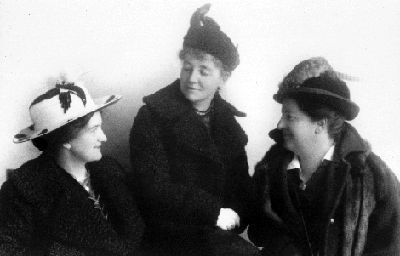
Government and Politics People
Manitoba Women Get Vote
Manitoba was the first province in Canada to grant women the right to vote and to hold political office provincially.
-
January 01, 1929

Resources and Environment
Riding Mountain National Park Established
Riding Mountain National Park was established. Located 265 km northwest of Winnipeg and perched almost 500 m above the prairie on the Manitoba Escarpment, the park is the "core protected area" of Riding Mountain Biosphere Reserve.
-
November 21, 1934
People
Birth of Howard Pawley
Howard Pawley, NDP premier of Manitoba from 1981 to 1988, was born in Brampton, Ontario.
-
January 08, 1943
Government and Politics
Garson Succeeds Bracken
Stuart Sinclair Garson became premier of Manitoba, succeeding John Bracken.
-
January 01, 1949
Indigenous Peoples
First Nations Win Right to Vote Provincially
Except in Nova Scotia and Newfoundland, Status Indians had been barred from voting provincially. Beginning with British Columbia in 1949 and ending with Quebec in 1969, First Nations peoples gradually win the right to vote in provincial elections without losing status or treaty rights.
-
May 05, 1950

Resources and Environment
Red River Flood, 1950
A flood of the Red River in Manitoba killed one person, forced 100 000 Winnipeg inhabitants to flee their homes and caused $100 million in damage.
-
August 17, 1956

Indigenous Peoples
Forced Relocation of the Sayisi Dene
Concerned that the Sayisi Dene were overhunting caribou around Little Duck Lake in northern Manitoba, the Province successfully petitioned the federal government to relocate the Dene community to the outskirts of Churchill. Despite government promises, the 250 displaced people were left destitute, lacking food, shelter and livelihoods on the tundra, far from their hunting grounds. By 1973, 117 members of the community had died, and survivors were left traumatized by years of extreme hardship. In August 2016, on the 60th anniversary of the forced relocation, Indigenous Affairs minister Carolyn Bennett issued a formal apology to survivors on behalf of the federal government.
-
July 16, 1958
Sports and Culture
Manitoba Theatre Centre
The first regional theatre, the Manitoba Theatre Centre in Winnipeg, staged its first production.
-
January 07, 1963

Resources and Environment
Red River Floodway Begun
Contracts were awarded for the construction of the Red River Floodway, in Manitoba, the largest earth-moving job ever undertaken in Canada.
-
March 01, 1966

People
Birth of Speed Skater Susan Auch
Four-time Olympian Susan Auch, who won two silver medals in speed skating at the Olympic Winter Games, was born in Winnipeg, Manitoba. She earned the 1995 Bobbie Rosenfeld Award as Canada’s female athlete of the year and was inducted into the Speed Skating Canada Hall of Fame, the Alberta Sports Hall of Fame, the Manitoba Sports Hall of Fame, the Canadian Olympic Hall of Fame and Canada’s Sports Hall of Fame.
-
June 25, 1969
Government and Politics
NDP Win Manitoba
The New Democratic Party under Edward Richard Schreyer won the Manitoba provincial election.
-
August 30, 1976
Government and Politics
Manitoba Liquor Commission Fined
The Manitoba Liquor Commission was fined $300 000 for violating wage and price controls, the first provincial agency fined for this.
-
November 17, 1981
Government and Politics People
Conrado Santos became the First Filipino Elected
Conrado Santos became the first Filipino to be elected to office when he was elected to the Manitoba Assembly for the New Democratic Party.
-
June 23, 1983
Communication and Transportation
Fuel-less Boeing Glides to Gimli
A Boeing 767 ran out of fuel and was guided by its pilot, with luck and skill, to a safe landing at Gimli, Manitoba.
-
November 21, 1988
Government and Politics People
Dr. Rey D. Pagtakhan Elected MP
Dr. Rey D. Pagtakhan, a Liberal from Manitoba, became the first elected Filipino Member of Parliament.
-
June 23, 1990

Government and Politics
Meech Lake Accord Collapses
The Meech Lake Accord collapsed after the self-imposed deadline passed. The collapse owed much to Premier Clyde Wells' blockage in Newfoundland and failure to pass in Manitoba thanks to MLA Elijah Harper. It led to further constitutional wrangles and the renewal of the separatist movement in Québec.
-
January 01, 1996

Resources and Environment
Wapusk National Park Established
Wapusk National Park became part of Canada's national parks system when a federal-provincial agreement was signed providing for its establishment. This national park extends to the east and south of Churchill, Manitoba, and protects a representative sample of the features and wildlife of the Hudson and James Bay lowlands.
-
May 01, 1997
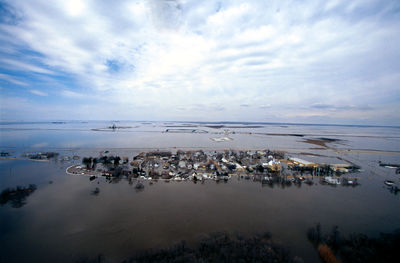
Resources and Environment
Red River Flood, 1997
The water crested on the worst flood since 1950 in southern Manitoba. The new floodway and 6.5 million sand bags protected Winnipeg but a number of other communities were inundated.
-
September 21, 1999
Government and Politics
NDP Regain Manitoba
Manitoba's NDP won a majority in a close provincial election. Leader Gary Doer became the new premier, ousting Conservative leader Gary Filmon, who had been premier for 11 years.
-
November 30, 1999

Resources and Environment
Freshwater Protest
BC, Alberta, Saskatchewan, Manitoba and Québec rejected a national accord that would have prohibited the export of fresh water.
-
October 27, 2007
People
Death of Nick Weslock
Winnipeg-born golfer Nick Weslock died in Burlington, Ontario, at age 89. Weslock dominated Canada’s amateur golf circuit during the 1950s and 1960s, winning many championships and representing Canada in international team events.
-
August 04, 2009
Government and Politics
Lee Becomes LG of Manitoba
The Honourable Philip Lee was installed as Manitoba's 24th Lieutenant Governor.
-
June 16, 2010
Indigenous Peoples
First National Truth and Reconciliation Event
The Truth and Reconciliation Commission of Canada hosts its first national event, in Winnipeg, MB. It explores the history of the residential school system, the experience of former students and their families and the impact such institutions had on Indigenous peoples in Canada. Over the next five years, six more events follow in cities around the country, with a national closing ceremony in Ottawa.
-
March 04, 2014
Indigenous Peoples
Sioux Valley Dakota Nation Self-Government Agreement
The Sioux Valley Dakota Nation Self-Government Agreement, the first self-government agreement on the Prairies, received Royal Assent. The Sioux Valley Dakota are located near Brandon, Manitoba. Not a treaty, the self-government protocols give the First Nation more control over governing decisions involving economic development, land management, education, housing and utility management.
-
May 26, 2014
Indigenous Peoples
Residential School Monument in Winnipeg
A monument to honour the Survivors of residential schools was unveiled in Winnipeg, Manitoba, at the Peace Garden outside of the Canadian Museum for Human Rights.
-
December 30, 2015
People
Death of Howard Pawley
Howard Pawley, the Ontario-born lawyer who served as NDP premier of Manitoba from 1981 to 1988, died in Windsor, Ontario, at age 81.
-
April 19, 2016

Government and Politics
Progressive Conservatives Win Manitoba Election
Manitobans elected Progressive Conservative leader Brian Pallister to a majority government, ending nearly 17 years of NDP rule
-
April 28, 2016
People
Death of Philip Kives
Entrepreneur and TV pitchman Philip Kives died in Winnipeg, Manitoba, at age 87. Born in 1929 on a farm near Oungre, Saskatchewan, Kives showed a natural talent for sales in his youth. He worked for several years as a travelling salesman before founding K-Tel International in the early 1960s. The company marketed everything from kitchen gadgets to compilation records, and became profitable under the leadership of Kives, who personally pitched products on K-Tel infomercials and even claimed to have invented this form of advertising.
-
September 17, 2016
Sports and Culture
Stillwell Finishes Rio Paralympics with Two Gold Medals
At the 2016 Paralympic Summer Games in Rio de Janeiro, Brazil, wheelchair racer Michelle Stillwell completed the 100 m race in a world record–setting time of 19:42. It was her second gold medal of the Games after winning the 400 m race a week earlier. A native of Winnipeg, Manitoba, and a serving MLA in British Columbia, Stillwell previously earned a gold medal for wheelchair basketball in 2000.
-
July 21, 2017

People
Death of Kenny Shields
Kenny Shields, lead singer of the hard-rock band Streetheart, died in Winnipeg, Manitoba, at age 69. Streetheart formed in Regina, Saskatchewan, in 1976, and soon relocated to Winnipeg, becoming a fixture of the city’s music scene. The band performed and recorded until the mid-1980s, enjoying significant popularity in Canada and winning a Juno Award. Shields later went on to perform under his own name was inducted, with Streetheart, into the Western Canadian Music Hall of Fame in 2003.
-
September 20, 2017
Indigenous Peoples
Sayisi Dene Reclaim Part of Traditional Territory
The Manitoba government signed an agreement to revert a portion of the Sayisi Dene’s traditional territory near Little Duck Lake into reserve land for the First Nation. In 1956, the Sayisi Dene were forcibly relocated from this land to the outskirts of Churchill, where they suffered years of extreme hardship.In August 2016, on the 60th anniversary of the forced relocation, Indigenous Affairs minister Carolyn Bennett issued a formal apology to survivors on behalf of the federal government.

